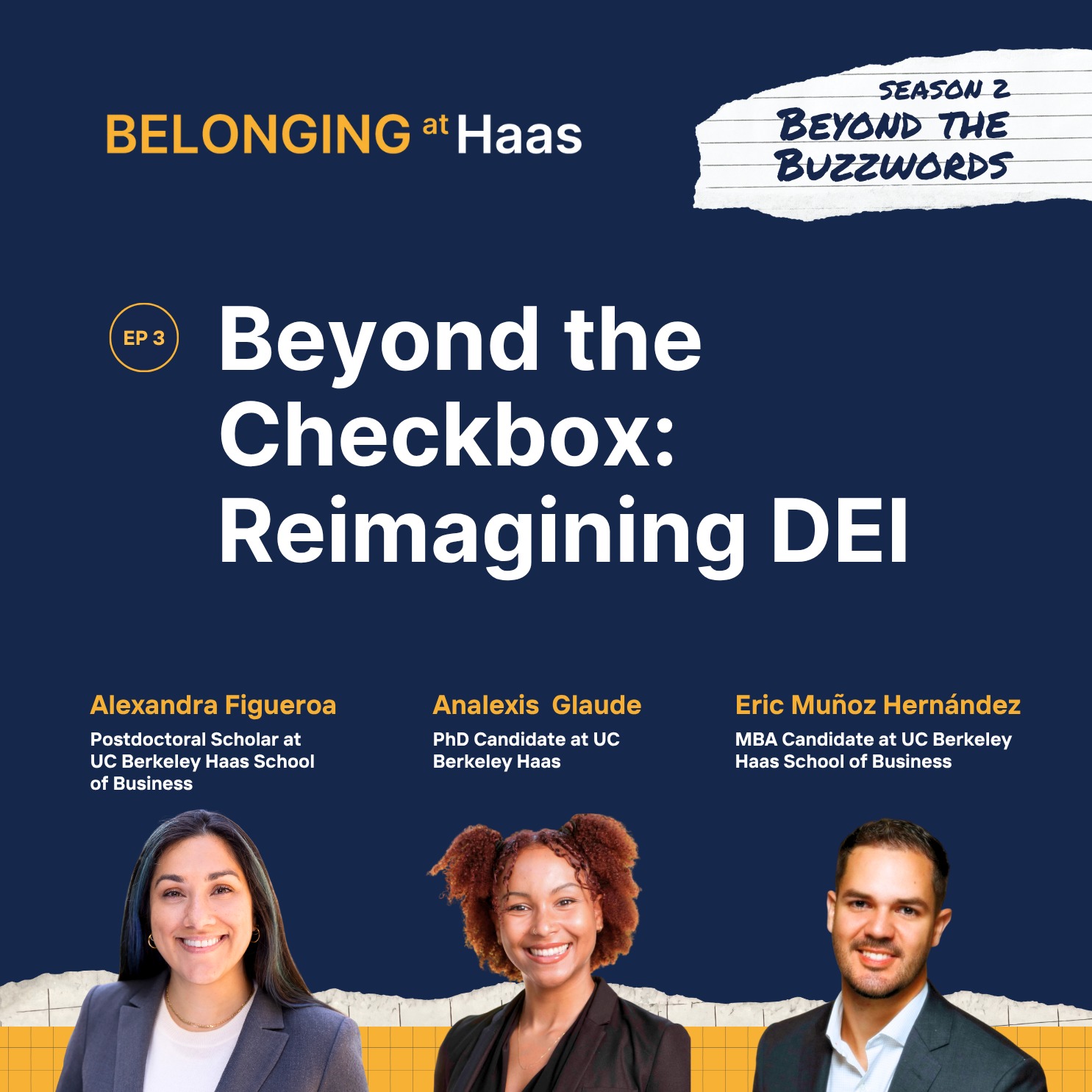Belonging at Haas

Belonging at Haas
Podcast Description
Belonging@Haas is a Berkeley MBA-student led podcast focused on Diversity, Equity, Inclusion, Justice, and Belonging (DEIJB). The show shares student perspectives and expert advice, tapping into new viewpoints and engaging in open, honest conversations that foster a welcoming and inclusive environment. The goal of this podcast is for listeners to finish each episode feeling more valued and empowered to succeed. In this podcast, diverse perspectives are celebrated, and differences are embraced.The Belonging@Haas Podcast is produced by University FM.
Podcast Insights
Content Themes
The podcast explores themes of DEIJB through various lenses, featuring topics such as diversity hiring practices, cultural nuances, and allyship among minority groups. Specific episode examples include discussions on the myths surrounding meritocracy in hiring, the experiences of Asian and Asian American students, and strategies for building inclusive spaces for Black women, all of which focus on breaking stereotypes and emphasizing the value of diverse perspectives.

Belonging@Haas is a Berkeley MBA-student led podcast focused on Diversity, Equity, Inclusion, Justice, and Belonging (DEIJB). The show shares student perspectives and expert advice, tapping into new viewpoints and engaging in open, honest conversations that foster a welcoming and inclusive environment. The goal of this podcast is for listeners to finish each episode feeling more valued and empowered to succeed. In this podcast, diverse perspectives are celebrated, and differences are embraced.
The Belonging@Haas Podcast is produced by University FM.
In this season’s final episode of Belonging@Haas, host Abbey Mui interviews Eric Muñoz Hernández, an MBA candidate at UC Berkeley Haas School of Business, about the future of Diversity, Equity, Inclusion, Justice, and Belonging (DEIJB), and those topics are then used to springboard a discussion between Abbey and expert guests Lex Glaude, a PhD Candidate in Business Administration at UC Berkeley Haas, and Alexandra Figueroa, a Postdoctoral scholar for the MORS group at UC Berkeley Haas School of Business.
Abbey is able to get some good insights on how DEI efforts can remain impactful and authentic in today’s climate. The episode tackles topics like the importance of inclusive environments, avoiding tokenistic practices, and the significance of consistency in DEI commitments. Their conversations aim to reimagine DEI's role, addressing both challenges and opportunities while providing expert advice for sustaining genuine and equitable practices in educational institutions and the corporate world. Join us now for the culmination of our three-episode series, as we look forward to the future.
Belonging at Haas Podcast is produced by University FM.
This episode was also produced by JC Chen.
Developed in partnership with the Haas MBA Student Government Association.
Episode Quotes:
True inclusion begins when everyone feels safe being themselves
[03:10] Eric Muñoz Hernández: Inclusion isn't just about who's in the room, but about whether people feel safe being themselves once they're there.
How Eric envisions the next generation of DEI efforts.
[07:37] Eric Muñoz Hernández: The next generation of DEI has to focus on design, not really slogans because we've done the awareness phase. Now it's really about systems. So how are we designing, recruiting and even classrooms so that inclusion is built in and not added on? So across the country, some schools are rebranding DEI as belonging or community. While the words might change, the purpose shouldn't. So the real future of the work is collaboration between students, faculty, and even the industry to try to create environments that reflect the diversity of the world we're preparing to lead in.
Rethinking how we hire
[18:22] Lex Glaude: Everyone has different strengths and talents, and I think it's important that we look at these different traits and be a little bit more inclusive in how we define and look at performance management.
The reason behind the DEI backlash according to research.
[14:30] Alex Figueroa: The research on backlash for DEI indicates that backlash is largely driven by zero-sum perspectives, or the perspective that DEI policies somehow take away resources from majority groups.
Show Links:

Disclaimer
This podcast’s information is provided for general reference and was obtained from publicly accessible sources. The Podcast Collaborative neither produces nor verifies the content, accuracy, or suitability of this podcast. Views and opinions belong solely to the podcast creators and guests.
For a complete disclaimer, please see our Full Disclaimer on the archive page. The Podcast Collaborative bears no responsibility for the podcast’s themes, language, or overall content. Listener discretion is advised. Read our Terms of Use and Privacy Policy for more details.